National Symposium On ‘The Handmade’
A Gram Seva Sangh, St. Joseph’s Institute of Management and Environment Support Group initiative
6 January 2018 ;
Time: 9 am to 4 pm ;
Venue: St. Joseph’s Institute of Management, 28/1, Primrose Road, Ashoknagar, Bangalore 560025. https://goo.gl/maps/GgoTXFYhbUF2
Downloads:
Handmade Symposium Poster
Handmade Symposium Concept Note Report of the Symposium on “The Handmade”
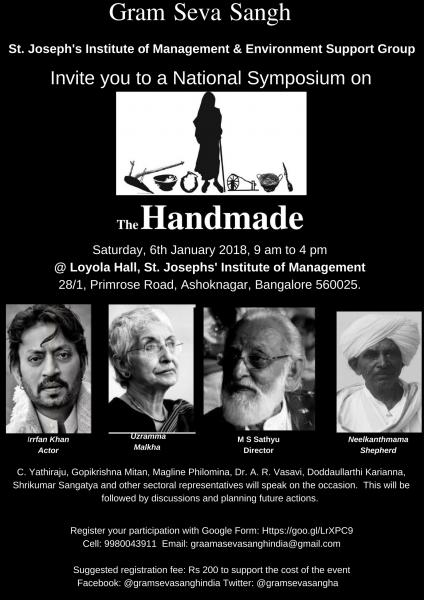
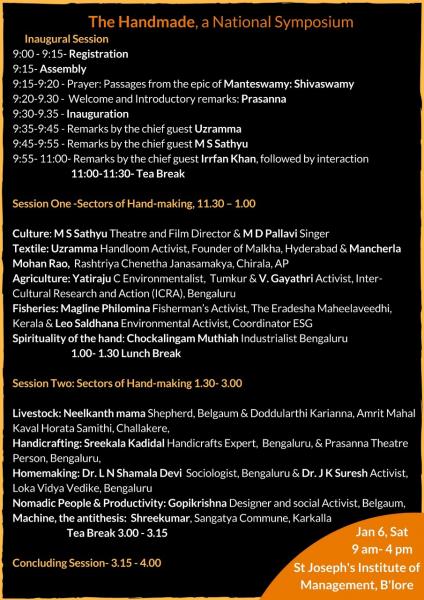

Report of the Symposium
on
THE HANDMADE
Organised by
Gram Seva Sangha, Environment Support Group and St. Joseph’s Institute of Management
6th January 2018, Bangalore
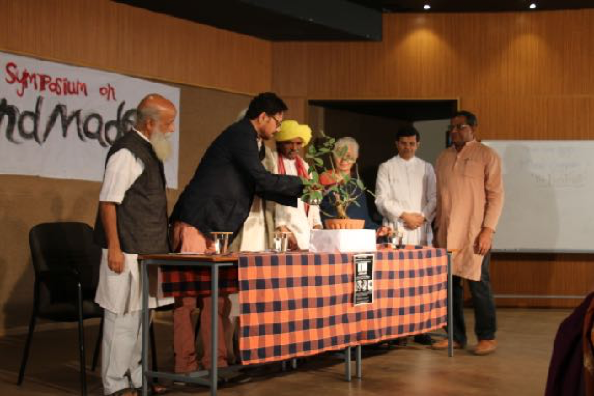
A story in song from West-Bengal accompanying the depiction on the Pattachitra resounds from the auditorium of St. Joseph’s Institute of Management, Bangalore, the venue of the National Symposium on The HANDMADE.
The handmade holds and embodies the continuity of tradition and culture, and bestows identity to communities within their homes, and their natural environment, through time. The crisis inflicted on artisans producing by hand in India, calls for redefining our understanding of work, of work relationships, consumer habits and tax regimes.
The symposium conceived and led by Gram Seva Sangha, in collaboration with Environment Support Group, is a part of the ongoing Tax-denial Sathyagraha on the handmade. The demand is simple and historic: that there is a crying need to acknowledge, accommodate and support the skill and craft of the artisan, farmer, fisherfolk, Adivasi, labourer, homemaker, industrial worker, et al, and to fundamentally acknowledge the due role of such handmade livelihoods in sustaining and contributing to global productivity, creativity and sustainability. Keeping this in mind, the following resolutions were proposed, and adopted after a day-long deliberation in the Symposium:
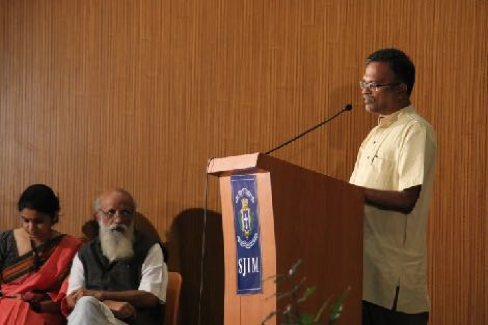
1.The GST council should make all handmade products zero taxed.
2.The Central and various State governments in India should take measures to get a better price for the handmade.
3.Since 60% of India’s population still depend on producing products with their own hands for their livelihoods, a separate Union Ministry must be setup for the Handmade, with budgetary allocations equivalent to that of the population size of those engaged with Handmade.
4. The Government and the other concerned agencies should adopt the definition of the Handmade: Any product that uses not less than two thirds of the hand process and not more than one thirds of the machine process should be treated as Handmade.
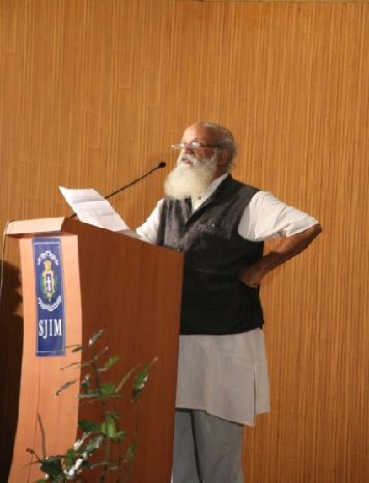 Prasanna Heggodu of Gram Seva Sangh explained that handmade systems are the enterprise of the future. It is a far better alternative to the prevailing neoliberal economy, which is extractive and increasingly reliant on the machine made. In addressing prevailing environmental, economic and social concerns, all outcomes of an extractive industrial system, and in advancing equality, morality, and in tackling alienation of individuals of society, the handmade is the solution, he said. However, this demands a shift in production to the hand/making from machine-making and not merely the tinkering of the existing systems which are extractive and destructive. He accepted that hand-making is a slow process of production. But it is holistic and closer to nature. It may appear economically inefficient, but is ecologically sustainable and can be made socially just. Machine-making is faster and appears economically more efficient. But the processes that support the machine made production systems cause extensive social and ecological damage, whilst also depriving large sections of society of their wealth. Machine-making is also a natural ally of neoliberal economic systems whose methods entail appropriation and aggregation of wealth, and essentially is an antithesis to cooperation and empowerment.
Prasanna Heggodu of Gram Seva Sangh explained that handmade systems are the enterprise of the future. It is a far better alternative to the prevailing neoliberal economy, which is extractive and increasingly reliant on the machine made. In addressing prevailing environmental, economic and social concerns, all outcomes of an extractive industrial system, and in advancing equality, morality, and in tackling alienation of individuals of society, the handmade is the solution, he said. However, this demands a shift in production to the hand/making from machine-making and not merely the tinkering of the existing systems which are extractive and destructive. He accepted that hand-making is a slow process of production. But it is holistic and closer to nature. It may appear economically inefficient, but is ecologically sustainable and can be made socially just. Machine-making is faster and appears economically more efficient. But the processes that support the machine made production systems cause extensive social and ecological damage, whilst also depriving large sections of society of their wealth. Machine-making is also a natural ally of neoliberal economic systems whose methods entail appropriation and aggregation of wealth, and essentially is an antithesis to cooperation and empowerment.
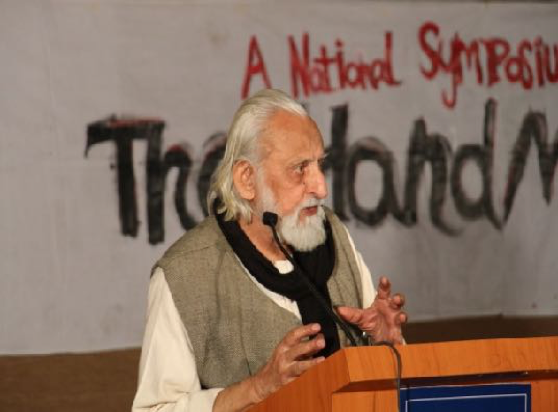
Renowned film-maker M S Sathyu questioned the need for taxing everything that is produced. He wondered why theatre is taxed 18% GST when artistes rarely make any money and find it difficult to survive in this highly commercialised and taxed world. The Government which must step in and support the handmade sector, is instead taxing it out of existence. Sathyu also recalled that displacement of the handmade produce is increasingly larger now, as we have entered an era where”every thing under the sun is taxed”, including culture and education which should not be taxed at all. And the tragic consequence of taxing everything is that theatres come under the tax category of commercial marriage halls (Kalyana Mantapa)! He said we must all actively resist such a tax regime and called upon artistes and audiences to come together against imposition of GST on the handmade, of which theatre is a part.
Uzramma of Malkha wished the new year be the beginning of a different kind of industrial revolution which is democratic, equitable and promises and delivers a sustainable future. She elaborated how the current system had been put in place through violence and that it also was being held up by employing violence. Such a system of production has its roots in slave labour in the US and in India, and recalled that it was through such violence that the textile industry was displaced, especially through the colonial period. She dwelled on the critical need for bridging the gap between poor artisans, producing with hand-looms, and only the rich elite buying the textile. Uzramma pointed towards inherent structures of traders and middle-men that promote the expansion of this gap and articulated how her organisation is attempting to open rural shops, so the economically weaker sections have access to the handmade.
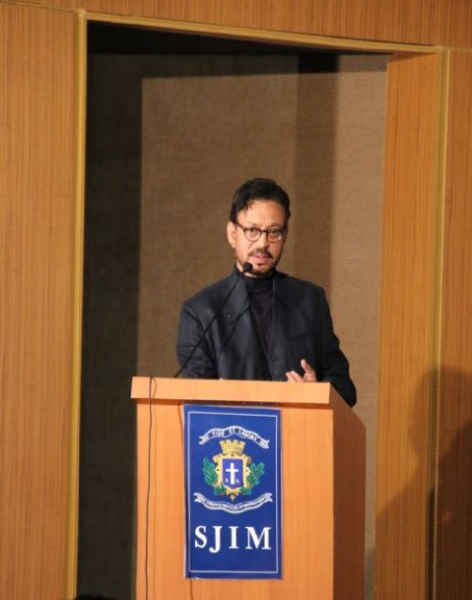 Celebrated actor Irrfan Khan in his inimitable and disarming style addressed the crisis in which the handmade sector has been placed today. He said: “I am an actor. My product is as much handmade as that of an artisan. For example, I do my acting by using my own hands, my own feet, my own emotions and my own speech. In this sense, hand-making people are my own brothers and sisters from the countryside. But, while I get a lot more value for my product, I feel sad that they have to struggle even for their existence. We definitely need to change this situation. There is no doubt about that. But what is significant here is that, this change is necessary even for me, the well paid actor. For, the production of my act happens at an enormous cost, both to the society and to the nature. The machine making system has become hopelessly unsustainable.” Irfan went not to say “acting comes from body, soul and heart”. He imagined how beautiful it would be if we were content with a hand-making system, with fair and right prices for handmade products and the erasure of exploitation. Irrfan Khan alluded to the prevailing mass-escapism through entertainment cinema and does not reflect lived experiences in society. This delusional discrepancy promotes the worshipping of film actors and sportsmen, while all and any work calls for worship. Handmade doesn’t stop at making by hand. Mind is contemplative, and works well with a rhythm which is harmonious with nature.
Celebrated actor Irrfan Khan in his inimitable and disarming style addressed the crisis in which the handmade sector has been placed today. He said: “I am an actor. My product is as much handmade as that of an artisan. For example, I do my acting by using my own hands, my own feet, my own emotions and my own speech. In this sense, hand-making people are my own brothers and sisters from the countryside. But, while I get a lot more value for my product, I feel sad that they have to struggle even for their existence. We definitely need to change this situation. There is no doubt about that. But what is significant here is that, this change is necessary even for me, the well paid actor. For, the production of my act happens at an enormous cost, both to the society and to the nature. The machine making system has become hopelessly unsustainable.” Irfan went not to say “acting comes from body, soul and heart”. He imagined how beautiful it would be if we were content with a hand-making system, with fair and right prices for handmade products and the erasure of exploitation. Irrfan Khan alluded to the prevailing mass-escapism through entertainment cinema and does not reflect lived experiences in society. This delusional discrepancy promotes the worshipping of film actors and sportsmen, while all and any work calls for worship. Handmade doesn’t stop at making by hand. Mind is contemplative, and works well with a rhythm which is harmonious with nature.
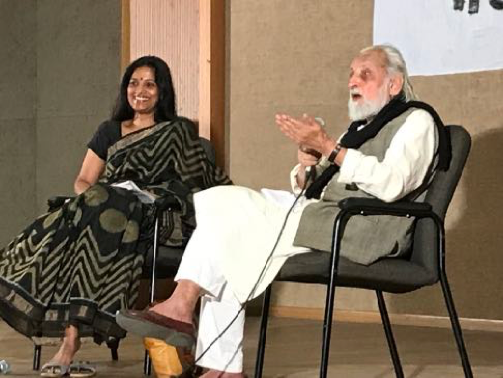
Well known theatre artiste and singer M D Pallavi discussed the use of technology in music acknowledging its utility to preserve and replicate but not so much to inspire. She shared her critical concern over the thoughtless introduction of technology into music, particularly through “sampling techniques”, which is forcing artistes to abandon music and switch to other livelihoods. She bemoaned how violinists and percussionists, for instance, have been displaced by the overemphatic presence of musical machines, and that they are now forced to become taxi drivers to eke out a living. She also engaged the audience in a soulful rendition of, Jeeni Jeeni, a song by Sant Kabir.
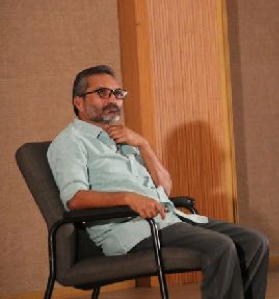 Mohan Rao, of Rashtriya Chenetha Janasamakhya, who has worked extensively with handloom weavers in Chirala, AP and rest ofthecountry, said that handloom weaving is a green industry. Even though Rs. 20,000 crores of income is generated through handloom and handicraft exports, the annual country-wide budget allotted to the sector is a meagre Rs 219 crores. The regressive policies followed by tax regimes since independence have forced handloom weavers from being entrepreneurs to low-waged labourers. And now the GST regime is further pushing them into impoverishment as the support of the Government in sustaining and encouraging the growth of the handmade sector is negligible, even absent.
Mohan Rao, of Rashtriya Chenetha Janasamakhya, who has worked extensively with handloom weavers in Chirala, AP and rest ofthecountry, said that handloom weaving is a green industry. Even though Rs. 20,000 crores of income is generated through handloom and handicraft exports, the annual country-wide budget allotted to the sector is a meagre Rs 219 crores. The regressive policies followed by tax regimes since independence have forced handloom weavers from being entrepreneurs to low-waged labourers. And now the GST regime is further pushing them into impoverishment as the support of the Government in sustaining and encouraging the growth of the handmade sector is negligible, even absent.
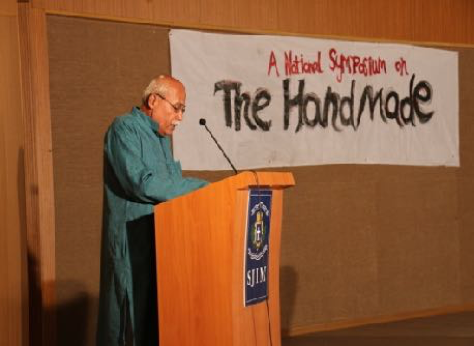
Yatiraju C, environmentalist from Tumkur and bestowed the 2017 Rajyotsava award by Karnataka Government, discussed the importance of agriculture for India’s economy, which, he argued,constitutes the maximum share of country’s exports. Despite this reality, marginal farmers are being labelled as “economically unviable” in a bid to make way for industrial farming methods and the monopolisation of. This is resulting in the food chain being poisoned and human health jeopardised through lifestyle diseases. Natural farming is the only hope for future, he concluded.
V. Gayathri of Inter Cultural Research and Action (ICRA) argued that agriculture is primarily handmade where all the activities, except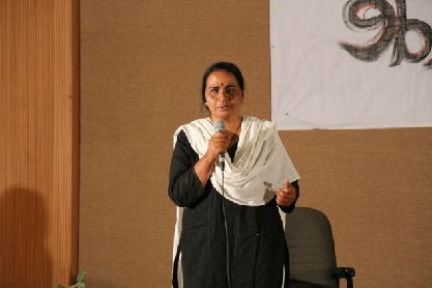 ploughing, involves manual labour. Despite this, the Minimum Support Price announced by the governments does not do justice to the work input, forcing farmers to prefer being labourers as there is more assured income and lower risk and liability. On the other hand, Governments are obsessed with the idea precision farming by using imported technology that is controlled by corporations. But what of women who have been practicing traditional farming techniques that is extremely complex and high precision, with no external input, she asked. Aren’t such super skills, such as sowing and transplanting, which are an intrinsic part of farming activity, and executed with folk singing to implement farming techniques involving great aesthetics and geometric rhythm, not technologically advanced methods that need further support, she enquired. Gayathri emphasised that consumers must be educated why organically and traditionally grown food are relatively expensive, but this is where the Government needs to step in and support such ecologically viable and socially just farm practices, that also generate millions of jobs.
ploughing, involves manual labour. Despite this, the Minimum Support Price announced by the governments does not do justice to the work input, forcing farmers to prefer being labourers as there is more assured income and lower risk and liability. On the other hand, Governments are obsessed with the idea precision farming by using imported technology that is controlled by corporations. But what of women who have been practicing traditional farming techniques that is extremely complex and high precision, with no external input, she asked. Aren’t such super skills, such as sowing and transplanting, which are an intrinsic part of farming activity, and executed with folk singing to implement farming techniques involving great aesthetics and geometric rhythm, not technologically advanced methods that need further support, she enquired. Gayathri emphasised that consumers must be educated why organically and traditionally grown food are relatively expensive, but this is where the Government needs to step in and support such ecologically viable and socially just farm practices, that also generate millions of jobs.
Magline Philomina, an activist from “The Eradesha Maheelaveedhi” of Kerala, who works with the fisher communities, spoke about 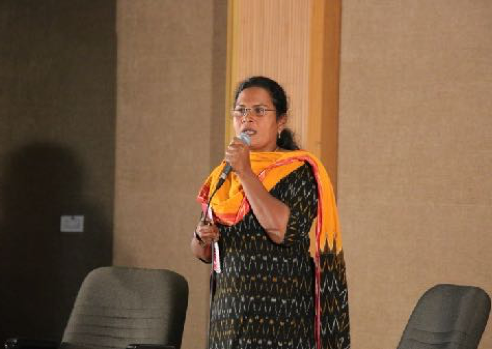 who women contribute significantly to the fishing activity, which is about 90% of the work, and yet are not recognised for their work. All traditional fishing is by hand, and does not hurt the earth, she said. Yet, instead of supporting this sector, the Government is keen on supporting giant corporations which promote infrastructure and industrialisation development along coastal areas which is displacing thousands of fisherfolk. On the one hand, the coastal community is increasingly facing threats and on the other, their lands are being grabbed off for ports, petrochemical complexes, for tourism, urban and industrial developments. “We need the sea. We need the beach to survive. Beaches are our commons. Where should we go fishing if we are not allowed to live and work on the coast?”, she painfully asked. She also shared that despite with all the satellite technology that there is now to assist in establishing early warning systems to support fisherfolk, none of this was employed effectively to save lives of fisherfolk impacted by the very severe Cyclone Ockhi that hit Kerala, Tamilnadu and Sri Lanka on 29 November 2017. At least 2200 fisherfolk are known to have perished and “Thousands are still missing”, she said.
who women contribute significantly to the fishing activity, which is about 90% of the work, and yet are not recognised for their work. All traditional fishing is by hand, and does not hurt the earth, she said. Yet, instead of supporting this sector, the Government is keen on supporting giant corporations which promote infrastructure and industrialisation development along coastal areas which is displacing thousands of fisherfolk. On the one hand, the coastal community is increasingly facing threats and on the other, their lands are being grabbed off for ports, petrochemical complexes, for tourism, urban and industrial developments. “We need the sea. We need the beach to survive. Beaches are our commons. Where should we go fishing if we are not allowed to live and work on the coast?”, she painfully asked. She also shared that despite with all the satellite technology that there is now to assist in establishing early warning systems to support fisherfolk, none of this was employed effectively to save lives of fisherfolk impacted by the very severe Cyclone Ockhi that hit Kerala, Tamilnadu and Sri Lanka on 29 November 2017. At least 2200 fisherfolk are known to have perished and “Thousands are still missing”, she said.
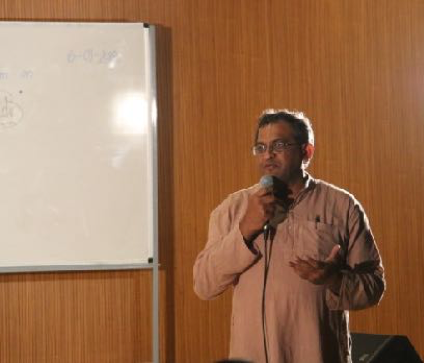
Leo Saldanha of Environment Support Group drew attention to a recent World Bank report reviewing key events of 2017, in which it is saidthat two-thirds of world’s wealth is made with people’s power – handmade. Yet, most of the world’s wealth is aggregated in a handful of individuals, and the situation is no different in India. He also threw light on how the poor are subsidising the rich. The rich are essentially extracting money and resources from the poor and yet are being incentivised by tax write-offs, loan waivers, and subsidies, while 2/3rds of India’s population that make by hand and are poor are heavily taxed, a burden that has increased with the GST regime.
Neelkanth Mama, a very senior shepherd and pastoral activist, articulated how there is a conscious effort to promote only those engaged with machines as educated, and said this is deeply problematic. He said shepherds may not be walking around with laptops. But they have extremely high levels of intelligence and make complex decisions every day without any assistance from modern technology. There is a difference between being knowledgeable and wise, and being merely informed, he said. The problematic reality is that today anything
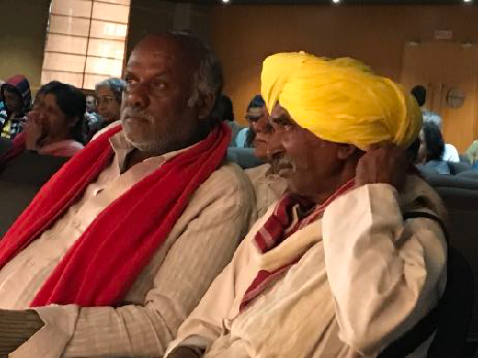
that does not come from a computer is not considered ‘knowledge’. He emphasisedthat human well-being is central to traditional sheep rearing methods, which involve grazing on diverse herbs in diverse habitats, as is the concern for the local biodiversity and wildlife. This is particularly the case with pastoral nomads. But the approach is totally compromised by industrial farming and livestock rearing methods, that is unnatural and anti-nature.
Doddaullarthi Karianna of Amrit Mahal Kaval Hitarakshana Horata Samiti of Challakere, Chitradurga, said his people do not need the government’s support as long as they have access to their grazing lands and are allowed to grow food with a
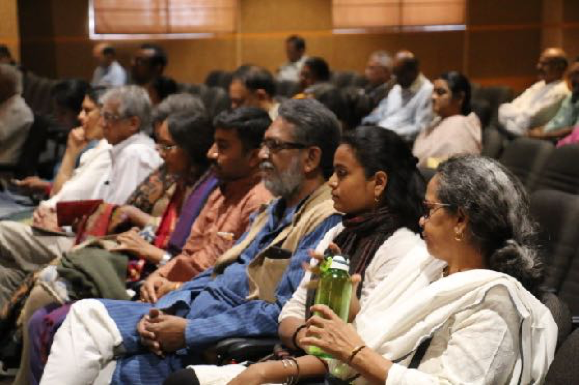 viable price support. But the prevailing economic policies displace the farmers and pastoralists, and even as they survive on the margins without any support from the State, their capacity to sustain their own livelihoods is snatched from them. He asked why there is an emphasis on enforcing a single tax regime on everyone, rich and poor, when the poor don’t get any support. Why can’t there be a similar single policy to ensure everyone is healthy, educated and has a good dwelling. Those with wealth continue to enjoy benefits and sops, while the poor suffer and are impoverished. He bemoaned that Constitutional values of equity and justice for all, is being destroyed every time a new economic policy is brought in.
viable price support. But the prevailing economic policies displace the farmers and pastoralists, and even as they survive on the margins without any support from the State, their capacity to sustain their own livelihoods is snatched from them. He asked why there is an emphasis on enforcing a single tax regime on everyone, rich and poor, when the poor don’t get any support. Why can’t there be a similar single policy to ensure everyone is healthy, educated and has a good dwelling. Those with wealth continue to enjoy benefits and sops, while the poor suffer and are impoverished. He bemoaned that Constitutional values of equity and justice for all, is being destroyed every time a new economic policy is brought in.
 Dr. Shamala Devi, Sociologist and Dr JK Suresh, activist from Lokavidya Vedike looked at homemaking as handmade. Despite theimportant role homemakers play in every aspect of life of the nation, building the country through homemaking, their contribution is absolutely not acknowledged. In such a scenario, that this contribution is not measured in terms of its economic contribution is a significant issue that is rarely talked about, said Dr. Shamala. We are trapped in age-old notions of separating the physical and mental labour which has its roots in the industrial revolution. Science has further objectified this notion, said Dr. Suresh.
Dr. Shamala Devi, Sociologist and Dr JK Suresh, activist from Lokavidya Vedike looked at homemaking as handmade. Despite theimportant role homemakers play in every aspect of life of the nation, building the country through homemaking, their contribution is absolutely not acknowledged. In such a scenario, that this contribution is not measured in terms of its economic contribution is a significant issue that is rarely talked about, said Dr. Shamala. We are trapped in age-old notions of separating the physical and mental labour which has its roots in the industrial revolution. Science has further objectified this notion, said Dr. Suresh.
Gopi Krishna, designer and social activist from Mitan, Belgaum, spoke of the nuances in traditional methods of nomadic shepherding. Their approach to productivity does not depend on the number of sheep, but on health and quality of each sheep, of their capacity to live in a paradigm that is not extractive, but supportive of humanity and nature. Their harmonious way of living with nature is such that they even revere predators which prey on their sheep, saying it is the due they need to part with to be in harmony with nature’s ways. Such deeply philosophical ways of living is rarely acknowledged in the highly commodified production systems of the day, and this needs fundamental re-thinking, argued Gopi.
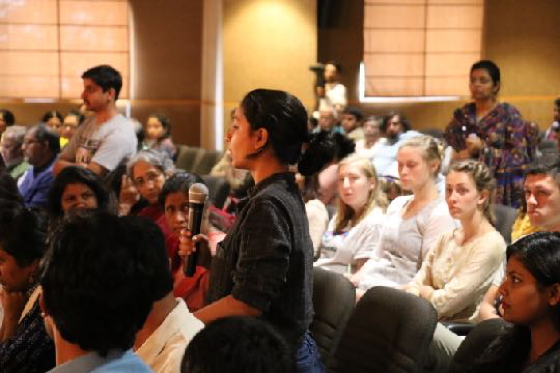
Sreekumar, farmer from the Sangatya Commune in Karkala, said that we have enough science and technology to move ahead. However, unless we correct our value systems, no amount of science can save humans. He emphasised the need to nurture cooperation, value our commons; and not become victim to competition, exploitation and accumulation.
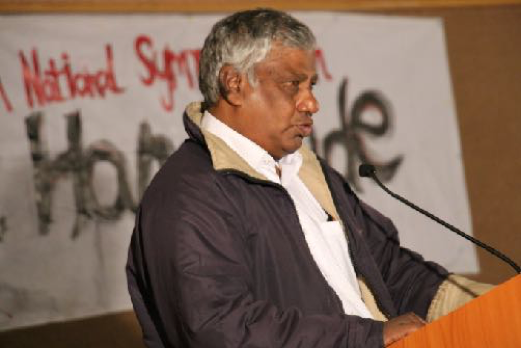
Fr. Francis Guntipilly of Ashirwad, paid a glowing tribute to Fr. Ambrose Pinto who passed away on 3rd January and said he was a socialactivist who always worked for the rights of the poor, in particular Dalits. Fr. Manoj, Director of the St. Joseph’s Institute of Management was present and supported the entire event with great generosity and extraordinary support of his staff.
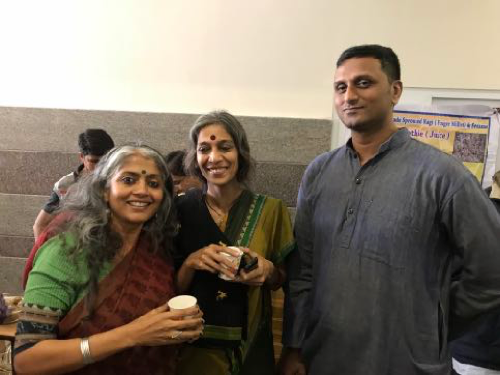
Towards the end of a day of intense deliberations, the Resolutions proposed were adopted and accepted by all delegates, unanimously.
This report has been prepared for the organisers by Jahnavi Pai, Namrata Kabra, Asha S., Apoorva Patil, Harsh Vardhan Bhati, Swetha Rao Dhananka, Kanishka.
News Reports on the Symposium:
Video Recording of the entire Symposium is accessible at: https://www.youtube.com/user/esgindia
My art is as much ‘handmade’ as that of an artisan: Irrfan Khan
Artisan community looks at tax revolution
Handmade is the way of life: Irrfan
http://www.deccanherald.com/content/652316/handmade-way-life-irrfan.html#
‘Handmade products should have zero tax’
There should be zero GST on handmade goods,’ experts tell government
ರಾಷ್ಟ್ರೀಯ ವಿಚಾರ ಸಂಕಿರಣದಲ್ಲಿ ನಟ ಇರ್ಫಾನ್ ಖಾನ್
ಕೈ ಉತ್ಪನ್ನ ಬಳಸಲು ಸಲಹೆ
http://www.prajavani.net/news/article/2018/01/07/545571.html
Vijay Karnataka e-paper:
http://www.vijaykarnatakaepaper.com/Details.aspx?id=28111&boxid=12255572
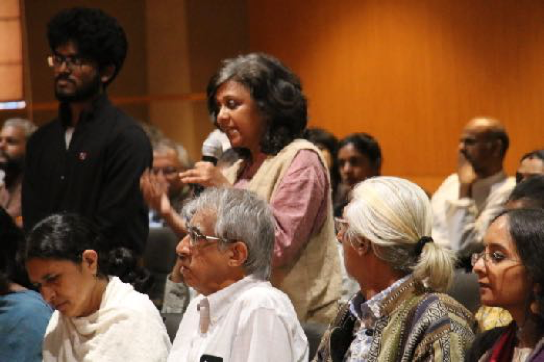
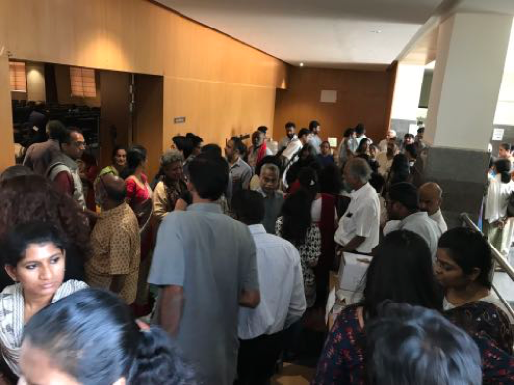
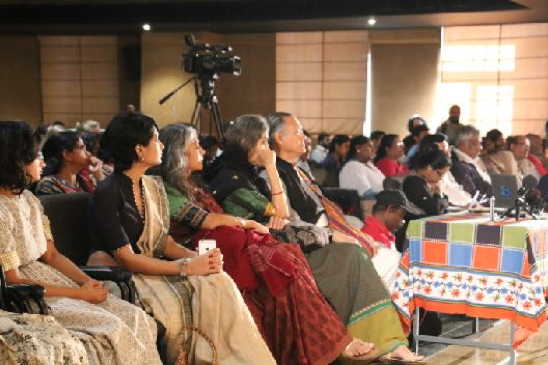
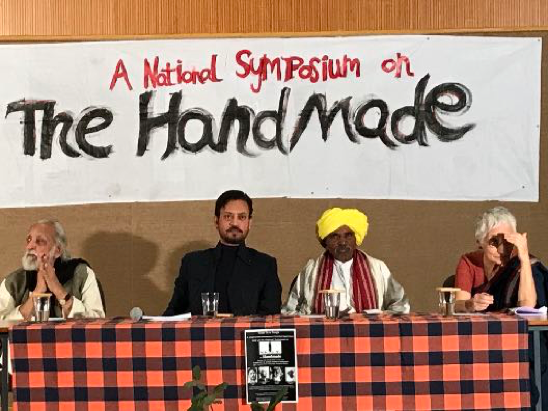
Why a Symposium on
The Handmade?
Because we have become machine-made!
All civilizations are polarized entities. But unlike civilizations of the past, in this civilization, the polarization is near complete. We have killed the handmade, almost.
Why not machine-made?
While the machine is efficient, it is unnatural, it promotes easy life. The hand is natural and hard working. While the machine kills nature, kills jobs, the hand protects nature, generates work and generates welfare. While the machine makes wealth for a few, the hand distributes it. Yet, today the machine has dominated over the hand almost completely, causing enormous stress, both for the society and for nature. It’s a dangerous situation. Social scientists agree that, if an immediate and rather drastic remedial measure is not undertaken, human civilization may not survive even. It is in this explosive situation that the Symposium is organized.
The Symposium
It is an assembly of like-minded people. We have a simple task at hand. We want to give notice to the society, demanding a better deal for the handmade. For that, we know, the production process needs to be changed. We shall change it.
A little after the Symposium, we are going to lead a long march. We shall march across an acutely impoverished, but a rich landscape of hand-making, the countryside of the Deccan plateau, in India, travelling on bicycles and meeting hard-working people and celebrating the Handmade. We shall then tell the world how beautiful the process is of making things with our own hands.
Handing spirituality back to people
Apart from the political, economic and social significance, making things with our own hand has a deep spiritual significance. While working with the hand one is closer to God. The Bhakti tradition in India, for example, had held firmly to the working hand. We shall reshape spirituality with the help of the Handmade.
A Journey to Light up the Dark Nation
The long march is going to follow a route taken by a sixteenth-century Dalit Saint Poet Manteswamy. The saint had defined his journey as a journey to light up the dark nation. How profound! During that journey, down south (from what is today’s northern Karnataka) he mobilized working people belonging to different sectors of the handmade, into saint-poet-activists. Manteswamy did not consider himself either a Hindu or a Muslim. He did not consider himself either a Shaivite or a Vishnavite. He was a Sufi. We shall follow in his footsteps.
The bicycle
The bicycle is a metaphor for a good machine. A machine that is in sync with the hard-working people. By peddling over it, we want to send a message that we are not anti-machine and that we simply want a balanced civilization.
How to join in
~ The Symposium concluded with an acknowledgement of moving forward with a Jaatha. You can register yourself for the cycle Jaatha, set to begin in Feb 2018, by writing to Abilash (contact details provided below).
~ You can donate a little money to Gram Seva Sangh.
~ You can start a Gram Seva Sangh in your town.
~ You can do many things.
But above all, remember, you need to deconstruct your own lifestyle first. You need to make it, a little simpler, a little harder. The machine has made all of us a little too soft.
Contact:
Abilash C. A.,
Gram Seva Sangh,
Flat 102, Shesha Nivas,
1st Block, 1st Main,
Thyagarajanagar, Bangalore 560028.
Cell: 9980043911
Email: [email protected]
Facebook: gramsevasanghindia
Twitter: @gramasevasangha
With warm wishes for the New Year
~~~~~~~~~~~~~~~~~~~~~~~~~~~~~~~~~~~~~~~
Environment Support Group
[Environmental, Social Justice and Governance Initiatives]
1572, Ring Road, Banashankari II Stage
Bangalore 560070. INDIA
Tel: +91-80-26713559-61 Fax: +91-80-26713316
Email: [email protected] Web: www.esgindia.org
Facebook: https://www.facebook.com/groups/esgindia/
community outreach,campaigns,events,Handmade,Irrfan Khan,M S Sathyu,symposium,Uzramma

